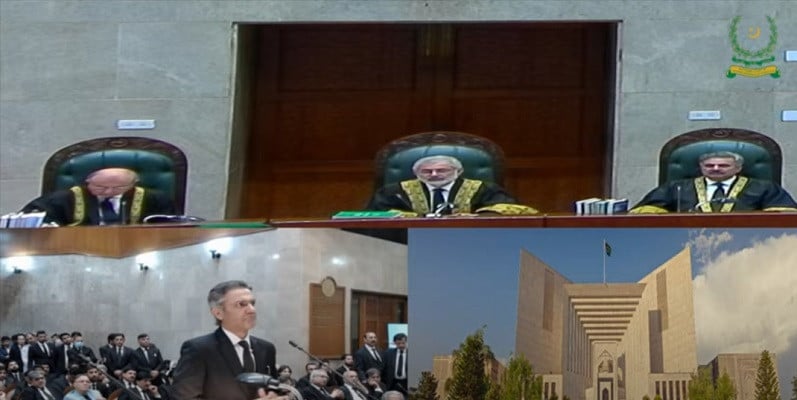Chief Justice of Pakistan, Qazi Faez Isa, gave a resolute remark on Wednesday, firmly declaring that any assault on the independence of the judiciary would not be tolerated. His remarks came as the apex court commenced hearings on a suo motu case initiated in response to a letter by six judges from the Islamabad High Court (IHC), alleging interference by intelligence agencies in judicial affairs.
The proceedings unfolded as a seven-member bench, led by Chief Justice Isa, convened to address the escalating controversy. Notably, former Chief Justice Tassaduq Hussain Jillani opted out of leading a one-man inquiry commission formed by the government to investigate the claims, citing concerns about jurisdictional propriety.
During the hearing, Attorney General for Pakistan Mansoor Usman Awan, along with legal representatives of key figures, appeared before the court. Chief Justice Isa wasted no time in emphasizing the paramount importance of judicial autonomy and accountability, unequivocally denouncing any attempts at undue influence or interference.
Of particular concern was the premature dissemination of petitions in the media before their official filing, prompting Chief Justice Isa to underscore the imperative of procedural integrity.
Attorney General Awan, in turn, underscored the inquiry commission’s powers, while Chief Justice Isa clarified the constitutional limitations on the Supreme Court’s authority in this regard.
Throughout the proceedings, Chief Justice Isa reiterated the judiciary’s unwavering commitment to operating within its constitutional bounds and underscored the critical importance of accountability across all institutions.
Discussions also delved into broader issues surrounding the integrity of the judiciary, including the case of former IHC judge Shaukat Aziz Siddiqui and concerns about political engineering within the judicial system. At the heart of the controversy lies a letter penned by IHC judges, accusing intelligence agencies of pressuring judges through abduction, torture, and surveillance.
This letter, addressed to the Supreme Judicial Council (SJC), has sparked a national debate over the autonomy and integrity of the judiciary. Former Chief Justice Jillani’s decision to recuse himself from the inquiry commission further underscores the complexities and sensitivities surrounding the matter.
Nevertheless, the government-mandated inquiry commission is expected to thoroughly investigate the allegations and make recommendations for action based on its findings. As the judiciary navigates this challenging terrain, the emphasis remains on transparency, accountability, and procedural integrity.
The formation of a full court, hinted at by Chief Justice Isa, signals a proactive stance in addressing concerns and upholding constitutional principles in the face of mounting scrutiny.
